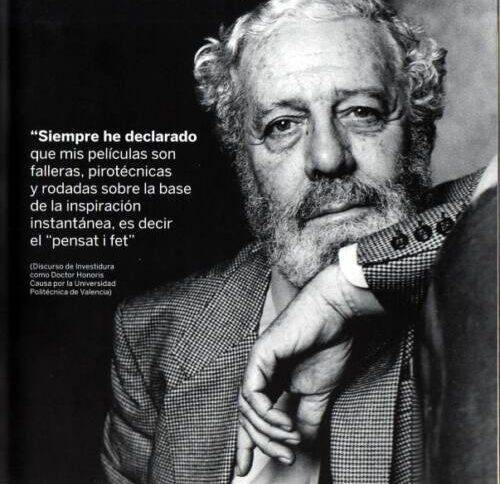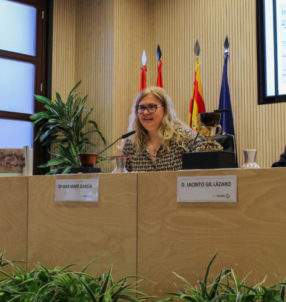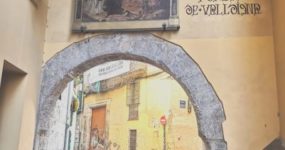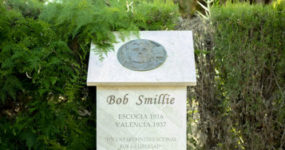##Luis Garcia-Berlanga (1921-2010) was one of the most influential Valencians of the 20th century. He was arguably the greatest Spanish film director of his time and an arch-satirist of Spanish life. Remarkably, much of his best and most cutting work was under the scrutiny of a censorious dictatorship.
Berlanga was born in Valencia in 1921 to a well-to-do family of local and national politicians. After the Spanish Civil War, Berlanga’s politician father was arrested and imprisoned as an enemy of the regime. Told his father would face the death penalty in 1941, Berlanga, on the understanding that it would help his father’s situation, was forced into enlisting in the infamous División Azul.
The ‘Blue Division’ was a military force of ‘volunteers’ organised by Franco to support the Nazi attack on Soviet Russia during the Second World War. Berlanga served at Novograd during the push to encircle Leningrad and, unlike many on both sides of the conflict, he was lucky enough to return home safe and sound in 1942.
Once back in Valencia, he studied law and philosophy at Valencia University and then went to study at the Institute of Research and Film Science in Madrid, which sparked his interest in a career as a film director.
Berlanga became famous for his ability to satirize Spanish society under the regime and still somehow escape the attentions of the censors. But it was not always thus. His first film was shut down by the dictatorship before filming even began. Berlanga learnt from this that if he was going to get any of his ideas on screen (and stay out of trouble with the authorities) he was going to need a subtler line in satire.
In 1951, Berlanga released his first film ‘Esa Pareja Feliz’. Here he established the formula which would serve him well throughout his career: Gently comic scenes and dialogue portraying the everyday lives of normal Spanish people, which were never explicitly critical at first sight but which maintained a tone of subtle but subversive irony that seeped through to the intelligent viewer. All this was mixed with a hint of farce and playful absurdity.
While people laughed at themselves, they also laughed at the hypocrisy of the regime, allowing Berlanga to challenge society under the dictatorship and particularly the passive compliance of the comfortable middle classes and the Catholic Church. For his second film in 1952, he perfected the formula for ‘Bienvenido Mr Marshall’, one of his most celebrated works. The film pokes fun at the dictator’s desperation for international recognition (and of course investment) by focusing on the preparations of a Spanish village for the visit of American dignitaries promising to bring investment and aid. The village, which is in Castille, goes to great trouble to make an impression for the Americans, even decorating itself in the stereotypical style of an Andalusian village (even though most of the villagers had never been anywhere near Andalusia) “because it’s what they will expect”, only for the Americans to just whizz through in their fast cars without even a wave.
‘Bienvenido Mr Marshall’ won the Cannes Festival prize. This gave Berlanga a certain amount of leeway but he was still closely watched. As he himself said: “In any other country, the success of the film would have given me complete artistic freedom but for me it just meant I was allowed to carry on working.”
The next decade was a golden period for Berlanga. He followed ‘Mr Marshall’ in 1956 with ‘Calabuch’ (changed from the original Valencian ‘Calabuig’ because the Castilians couldn’t pronounce it correctly). It tells the story of an American nuclear scientist who is hiding out in a Valencian village to avoid his research being used by the military to make weapons. He becomes so involved in village life that (this being Valencia) he helps them win a fireworks competition.
His 1957 film, ‘Los Jueves Milagro’, despite being a comedy farce, was his most stinging attack on the church. The mayor of a village hires a man to dress up as an angel and perform a miracle every Thursday in order to attract pilgrims and government investment.
Soon even Hollywood started to take notice and Berlanga was nominated for a Best Foreign Film Oscar for ‘Placido’ in 1961. Despite acknowledgement from the Academy and huge popular acclaim, he was given no official plaudits from the Spanish film industry. It did, however, put him in a position to make his most direct criticism of the regime with ‘El Verdugo’ in 1963. The film told the story of a grey civil servant who happens to be in charge of the garrotte used to put those condemned by the regime to death. With a typically Spanish type of nepotism, the man is trying to ensure that his son-in-law will be his successor, but the boy isn’t so keen and is given to fainting at the sight of blood. The film won first prize at the Venice Film Festival but was again ignored by the official prizes at home.
Although he spent most of his life working in Madrid, Berlanga was never slow in showing his pride in being Valencian. Valencian references, Valencian street names and surnames appear in all his films. A lifelong fan of Valencia Football Club, he described Valencia’s defeat in the 2000 Champions League final as one of the worst experiences of his life which, considering that he served on the Russian front, is really saying something.
It wasn’t until after the dictatorship that Berlanga got the official recognition he deserved in his home country, winning—between 1980 and his death in 2010—every award the Spanish film industry and government could bestow on him long after his best work had been done. “What am I suddenly doing right?” he wondered. With the dictatorship no longer there to subvert, his later films focused on the humanism which was present in all his work, the little man in the midst of the big picture.
To celebrate 100 years since his birth, La Generalitat Valenciana have declared 2021 to be “García-Berlanga Year.”
David Rhead and José Marín
Article copyright 24/7 Valencia
Go to this link for EXCLUSIVE REPORT about ‘ViSCA / ¡VIVA BERLANGA!’ Art Exhibition at MuVIM (Valencia) until September: https://247valencia.com/art-in-valencia-at-muvim-homage-to-legendary-film-director-berlanga/
Related Post
Leave a comment Cancel reply
This site uses Akismet to reduce spam. Learn how your comment data is processed.

























1 Comment
Pingback
11th April 2021 at 11:02 am